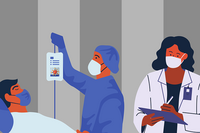
30 Jul How Can a Patient Contribute to Avoid Medical Mistakes?
Making informed decisions about our health can feel overwhelming at times. Thankfully, there
are steps we can take to be active participants in our healthcare journey.
By working together with medical professionals, the steps to prevent medical mistakes become
clearer, allowing us to receive the safest and most effective care possible. Let’s explore some
ways we can contribute to a positive healthcare experience.
Be Informed and Engaged in Your Care
It is crucial to feel informed and involved in your healthcare plan. Understanding your diagnosis
and the different treatment options available empowers you to make the right decisions.
Reliable sources, like government health websites or reputable medical organizations, can
provide clear information about your condition. Don’t hesitate to ask your doctor questions!
Open communication is key – the more you understand, the better equipped you’ll be to
collaborate with your healthcare team for the best possible outcome.
Medication Safety: Your Active Role
Medications are vital to our health, but keeping track of all of them can be tricky. To ensure
safety, maintaining an up-to-date medication list is key.
● Be your own medication expert: Keep an up-to-date list of all your medications,
including prescriptions, over-the-counter drugs, vitamins and supplements. This helps
avoid potential complications or missed information.
● Communication is key: Share your complete medication list with every doctor, dentist,
or pharmacist you consult with. This ensures everyone involved in your care has a full
picture.
● Know your allergies: Make sure your healthcare providers are aware of any allergies
and past negative reactions you’ve experienced with medications.
Understanding Your Prescriptions
Reading prescriptions can sometimes feel like deciphering a code! Reading and understanding
what your doctor has written is vital for your safety. Don’t be shy if there’s something unclear
about the dosage, how often to take the medication, or even how to take it.
Ask your doctor or pharmacist for clarification – they’d much rather explain things twice than
leave you with confusion. Knowing potential side effects is also important. A quick
conversation with your healthcare provider can help you understand what reactions to watch out
for and what’s normal.
Preparing for Procedures and Hospital Stays
Undergoing a procedure or hospital stay can be stressful. Did you know researching a hospital’s
experience with your procedure can bring peace of mind? Hospitals often publish information
about their success rates online.
Another important factor is hand hygiene! Don’t hesitate to politely remind healthcare workers to
follow recommended practices, like using gloves. It’s your right, and it helps prevent infections.
Communication is Key: Before, During, and After Surgery
Open communication is especially important before surgery. Before going under the knife, have
a clear conversation with your doctor. Double-check the surgical site and procedure details to
avoid any confusion.
Additional Tips to Reduce Risks
Here are some additional tips to keep yourself safe:
● Follow your prescription: Taking your medications exactly as prescribed is crucial.
Skipping doses or taking the wrong amount can be dangerous. Set reminders or use a
pill organizer to stay on track.
● Organized medical records: Keeping all your medical records, including test results
and doctor’s notes, in one place allows healthcare providers to get a complete picture of
your health. This can help them avoid mistakes and provide the best possible care.
Consider having a friend or relative advocate during your hospital stay. This person can be a
helpful extra set of ears and a source of support as you recover.
The information on MedicalResearch.com is provided for educational purposes only, and is in no way intended to diagnose, cure, or treat any medical or other condition.
Some links may be sponsored. Products are not warranted or endorsed.
Always seek the advice of your physician or other qualified health and ask your doctor any questions you may have regarding a medical condition. In addition to all other limitations and disclaimers in this agreement, service provider and its third party providers disclaim any liability or loss in connection with the content provided on this website.
Last Updated on August 2, 2024 by Marie Benz MD FAAD
